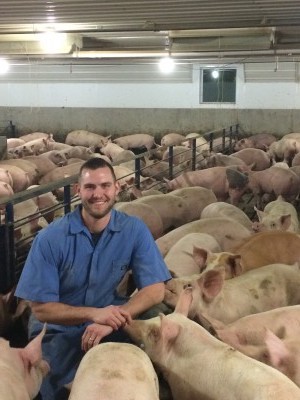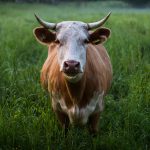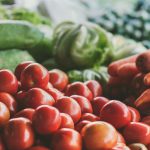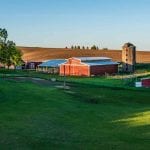Nathan Nieuwendorp is a farmer, raising pigs and growing corn and soybeans. He lives near Inwood, Iowa, with his wife, Jacklyn, who is a middle-school teacher. Nathan and Jacklyn enjoy being actively involved in their local church, Inwood Christian Reformed Church.
How would you describe your work?
I’m a caretaker—responsible for the well-being and growth of the pigs under my care. My mornings begin in the barn, walking the pig pens and looking for any pigs that are sick. I also survey the equipment, making sure the feeders and waterers are working and that the barn is maintaining the right temperature. Before my day ends, I check the pigs to ensure their environment is conducive to their well-being.

As an image-bearer of God, I have the responsibility of caring for God’s creation. I get to interact with creatures made by God, and raise them to maximize their well-being and the well-being of the ecosystem we inhabit. I provide for all the needs of my pigs (foot, water, shelter, etc.), which reminds me how much I depend on God—not only for my daily sustenance, but also for my every breath.
How does your work give you a unique vantage point into the brokenness of the world?
Despite my best efforts, my pigs contract and struggle with diseases, and some die. Yet pigs are not moral creatures. Death didn’t enter the world because a pig sinned, of course, but because Adam sinned. Since that time, creation—yes, pigs included—has been groaning, awaiting its liberation from bondage, decay, and disease.
Also, much misinformation is spread about my profession. Only 2 percent of the U.S. population is involved in production agriculture, of which pig farmers are a subset. Most people don’t personally know a farmer, a disconnect that can easily lead to caricatures. When the world smears my occupation, despite my best efforts to care for and steward God’s creation, I see brokenness.
Jesus commands us to “love our neighbors as ourselves.” How does your work function as an opportunity to love and serve others?
When I’m walking the pens and treating pigs at 5:30 a.m., there’s no one in the barn but me. But my work, when taken in its broader economic and social context, affects my neighbors. For most people around the world, daily nutrition is a top concern. As a pig farmer, God uses me to meet that need. Raising pork in an efficient and environmentally sustainable way, I’m helping to create low-cost, high-quality product to meet both the culinary desires of the well-fed and also the dietary needs of the poor and disadvantaged. My vocation fulfills my God-ordained purpose within his world, and I’m humbled by the opportunity to participate in his work of providing “daily bread” to my neighbors—near and far.
Editors’ note: TGCvocations is a weekly column that asks practitioners how they integrate their faith and their work. Interviews are condensed and edited.
Is there enough evidence for us to believe the Gospels?
 In an age of faith deconstruction and skepticism about the Bible’s authority, it’s common to hear claims that the Gospels are unreliable propaganda. And if the Gospels are shown to be historically unreliable, the whole foundation of Christianity begins to crumble.
In an age of faith deconstruction and skepticism about the Bible’s authority, it’s common to hear claims that the Gospels are unreliable propaganda. And if the Gospels are shown to be historically unreliable, the whole foundation of Christianity begins to crumble.



































